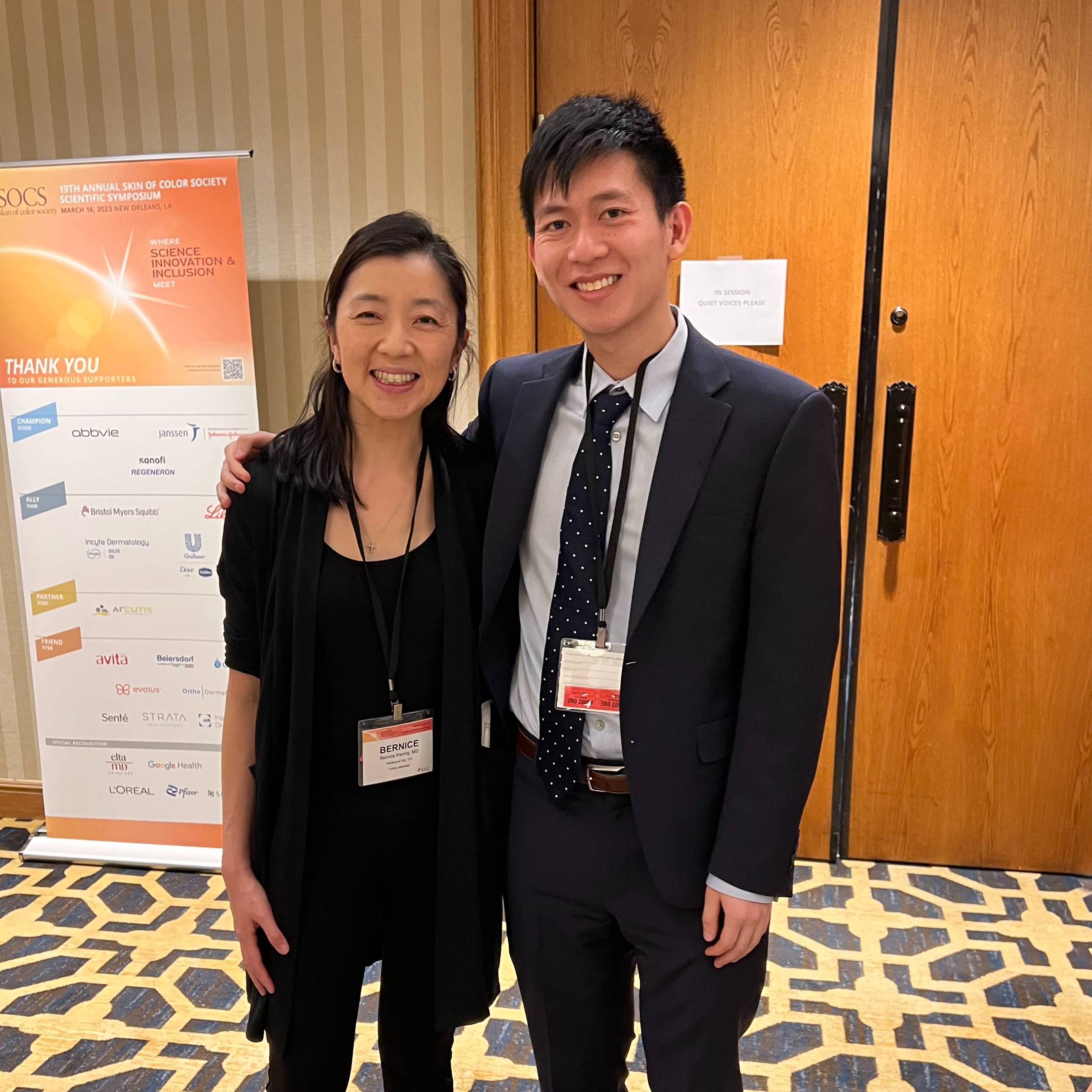
Dr. Bernice Kwong with mentee Alexander Wong
I am so grateful that I was able to participate in the SOCS Mentorship program with Dr. Bernice Kwong. Despite her incredibly busy schedule and many responsibilities, Dr. Kwong and I met every month to discuss skin of color topics specifically in supportive oncodermatology. With her mentorship, we came up with research projects that she noticed disproportionately impacted her skin of color patients in clinic. She taught me incredibly valuable lessons on how to turn important clinical questions and translate that into action through conducting research to answer those questions. We are still actively working on three projects, and she has been so supportive in every step of the way, from IRB development to manuscript drafting. I had the opportunity to spend a day observing her in clinic and it was so clear to me how compassionate she was towards her patients, and how she considered her patients’ various skin tones in the context of diagnosing and managing their conditions. We have also discussed various DEI issues and how conditions that disproportionately affect SOC patients are more likely to be brushed off in academia, and how we can combat these disparities affecting the most underserved patients. This mentorship program was also during my clerkship year and board exams, and I always felt like Dr. Kwong was someone I could confide in when I was struggling, and someone who I could celebrate my triumphs with as well. I feel like the luckiest mentee to spend time with someone incredible like her. We have enjoyed working with each other so much that we applied for the SOCS Observership Grant to continue our work together, and I am so excited that I will get the spend an entire month with Dr. Kwong and her team at Stanford. Thanks to the SOCS I have a lifelong mentor who I know will support me in succeeding personally and professionally, and I hope I can become a brilliant and caring physician like her who cares for the most vulnerable patients.
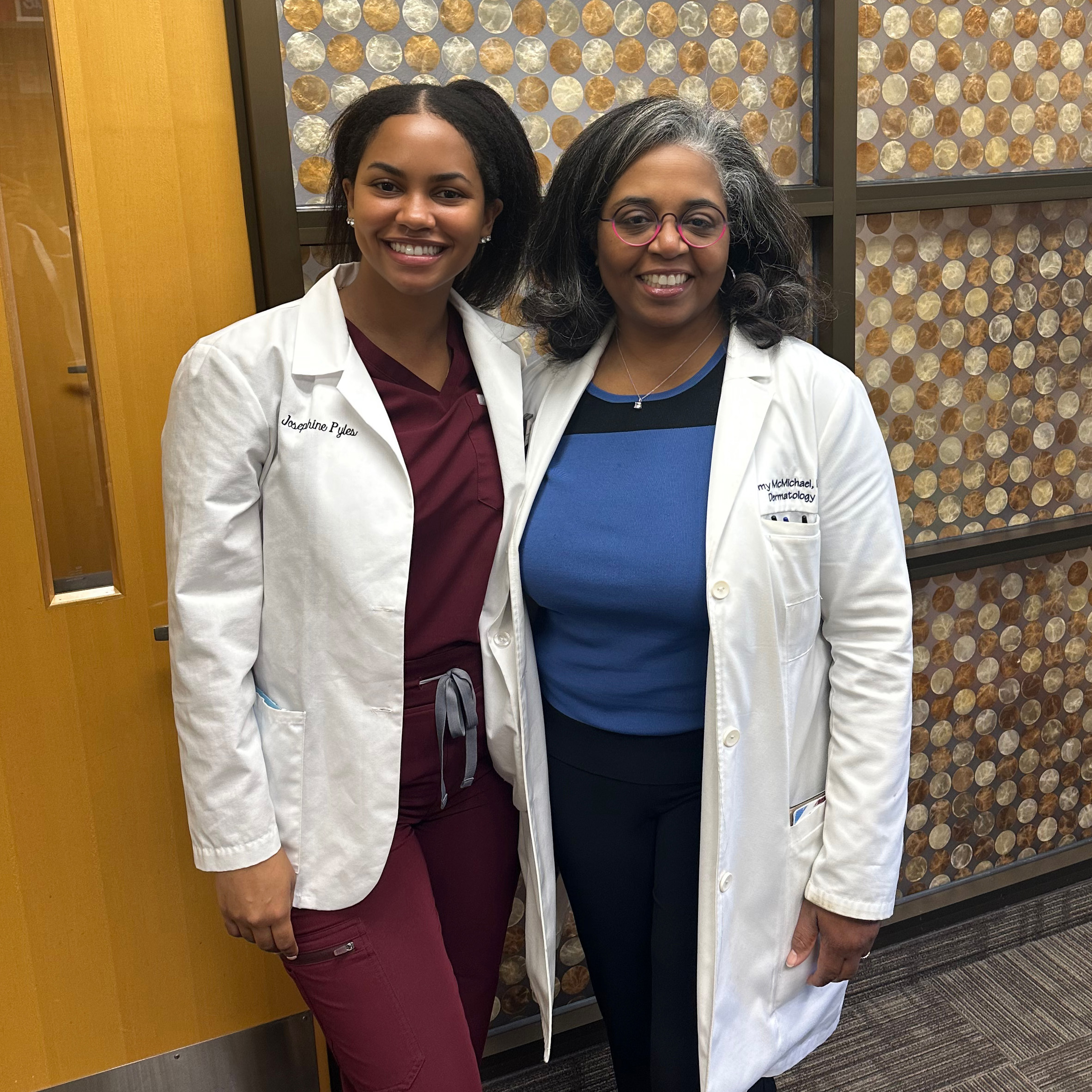
Mentee: Josephine Pyles
Mentor: Amy McMichael, MD
Wake Forest School of Medicine
During my observership with Dr. Amy McMichael at Wake Forest Dermatology in North Carolina, I had a wonderful experience that deepened my knowledge and passion for dermatology, particularly in areas related to skin of color and hair loss. Throughout my time there, I was encouraged to explore my specific interests, including conditions such as Central Centrifugal Cicatricial Alopecia, Androgenetic Alopecia, Frontal Fibrosing Alopecia, and Alopecia Areata. This hands-on learning experience was invaluable and even resulted in us coming up with an exciting research project to work on this year.
In addition to my focus on hair loss and skin of color, I gained exposure to a broader range of medical and cosmetic dermatology. I observed and participated in a variety of treatments and procedures, including laser therapies, which enhanced my understanding of the diverse methods used in dermatologic care. The practical experience I gained during my time at Wake Forest has undoubtedly enriched my clinical knowledge and strengthened my skills in dermatology, which is valuable as I navigate the upcoming residency application cycle.
Despite the brief duration of my observership, the mentorship I received from Dr. McMichael was incredibly rewarding. In just two weeks, the connection we established provided valuable direction as I continue to pursue my professional goals. Dr. McMichael's willingness to share her expertise and insights was truly the highlight of this experience, and I am deeply grateful for her mentorship.
Moreover, my observership coincided with the International African American Theater Festival, which Dr. McMichael and I attended with her friends and family. This cultural experience added a meaningful dimension to my time in North Carolina, providing a unique lens through which I could appreciate the intersection of African American culture, history, and the incredible opportunity that I have to pursue a career in medicine, built by those who have come before me.
In summary, my observership with Dr. McMichael was a wonderfully enriching experience. It provided me with knowledge in areas of personal interest, valuable clinical experience, and the opportunity to build a lasting mentorship relationship. I am deeply grateful for the support and guidance I received from Dr. McMichael, the Skin of Color Society, and the entire team at Wake Forest. I leave this observership feeling more prepared and inspired to pursue a career in dermatology, with a particular focus on skin of color and hair loss conditions.
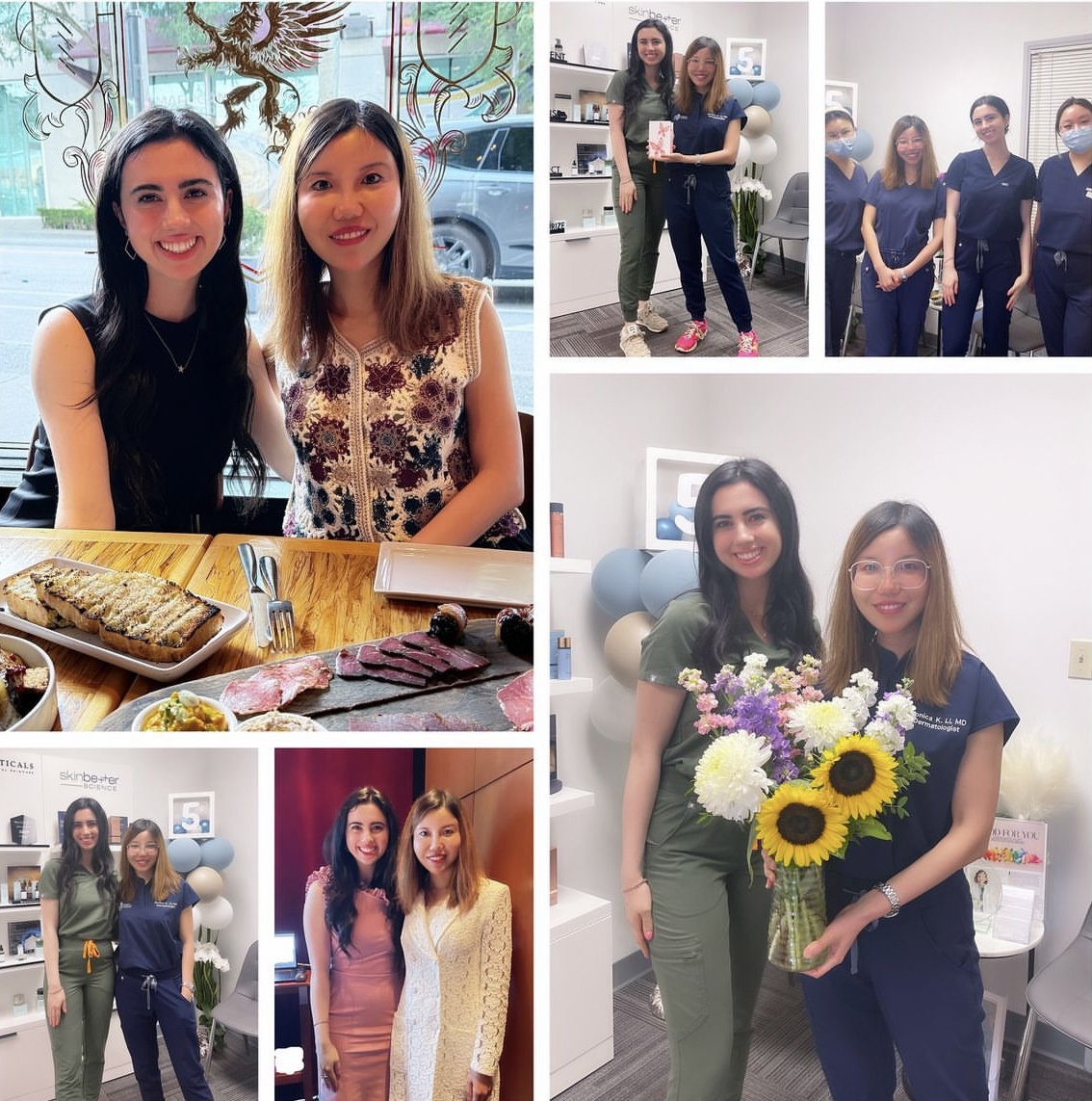
Mentee: Aliyah King, BA
Mentor: Monica Li, MD
University of British Columbia Department of Dermatology and Skin Science
It is profoundly empowering when a mentor believes in you – not only in who you are, but in what you can become. It’s even more impactful when that belief is paired with action, as they actively foster spaces for you to grow. – Aliyah King
During my one-week observership with Dr. Monica Li, as the first-ever awarded Canadian pair for the 2024 Skin of Color Society Observership Grant, I experienced the profound impact of mentorship through a range of enriching experiences that deepened my understanding of dermatological care for skin of color (SOC) patients.
Dr. Li, a double board-certified dermatologist, renowned globally for her expertise in cosmetic dermatology and laser medicine, practices in Vancouver and Surrey—two of Canada's most ethnically diverse cities, with a predominately Asian and Southeast Asian population. This environment provided an invaluable opportunity to learn the unique considerations in SOC dermatology. For example, I learned how the heightened risk of post-inflammatory hyperpigmentation in SOC patients necessitates a more conservative laser treatment approach, often utilizing combination therapies for optimal outcomes. Dr. Li’s detailed explanations during treatments emphasized minimizing adverse events and discomfort, which greatly enhanced my clinical knowledge. Throughout Dr. Li’s clinics, I also observed the intersection between cosmetic and medical dermatology, where many patients sought treatments for conditions like melasma, acne, keloids, and post-inflammatory hyperpigmentation — conditions that are more common and/or have more pronounced effects in SOC populations. These cases underscored how cosmetic concerns are often intertwined with medical concerns. Throughout all cases, Dr. Li guided me in developing a structured framework, including differential diagnoses and treatment plans, which will serve as a resource throughout my training. Overall, Dr. Li’s ability to combine intricate scientific expertise with a compassionate, patient-centered approach has provided me with a model of what it means to be an exceptional physician.
Dr. Li went above and beyond to foster opportunities for me to expand my knowledge of SOC dermatology throughout my week in British Columbia. Highlights included participating in the University of British Columbia (UBC) Department of Dermatology and Skin Science Grand Rounds, attending Dr. Li’s lecture on SOC laser medicine for UBC dermatology residents, and joining a continuing medical education dinner where Dr. Li discussed acne management in diverse populations. We also collaborated on a systematic review and meta-analysis on bimatoprost for the treatment of vitiligo – a condition of substantial stigma particularly in SOC patients. This work is being prepared for submission to Clinical, Investigative, and Cosmetic Dermatology and the Annual SOC Society Scientific Symposium. Additionally, Dr. Li encouraged me to join the American Society for Laser Medicine and Surgery, providing further avenues to deepen my understanding of laser medicine. Even before my arrival in BC, I had the privilege of learning from Dr. Li during her presentations at the Canadian Dermatology Association Conference and Acne Summit, which laid a strong foundation for my continued education. These comprehensive experiences significantly enriched my knowledge and passion for advancing dermatological care in SOC communities.
In addition to her science and technical expertise, Dr. Li exemplifies the highest degree of the art of medicine through her compassionate, comprehensive, collaborative, and personalized approach to patient care. A pearl that Dr. Li emphasized was the profound impact dermatological conditions can have on a patient’s quality of life, and often in ways that are more significant for the patient than others might perceive. This understanding reinforced the importance of treating each patient as an individual, ensuring they are involved in all decisions, and avoiding preconceived notions or assumptions. Dr. Li’s practice is a testament to the power of recognizing and addressing the unique needs of every patient.
I am deeply grateful to have had the opportunity to learn in such a supportive and hospitable environment. Dr. Li shared how her mentors inspired and guided her, shaping her into the clinician she is today. Now, she dedicates herself to helping guide others. This experience has instilled in me a deep desire to do the same. Dr. Li’s passion for mentorship was evident throughout our entire time together, culminating in a beautiful dinner to close our week. I have come to understand that mentorship has a powerful ripple effect, touching not only the mentee but also the lives of those they influence. Dr. Li truly upholds the term ‘mentor’ to the highest degree, and I will continue to cherish the experiences of our week together and beyond.
Overall, I express my deepest gratitude to Dr. Monica Li, the Vancouver Skin MD team, The University of British Columbia Faculty of Medicine, and The University of British Columbia Department of Dermatology and Skin Science for graciously welcoming me to the beautiful British Columbia. I am honoured to have learned from world-class educators in dermatological care who serve patients of diverse skin tones and types. Thank you to the Skin of Color Society for making this inspirational experience and invaluable mentorship possible.
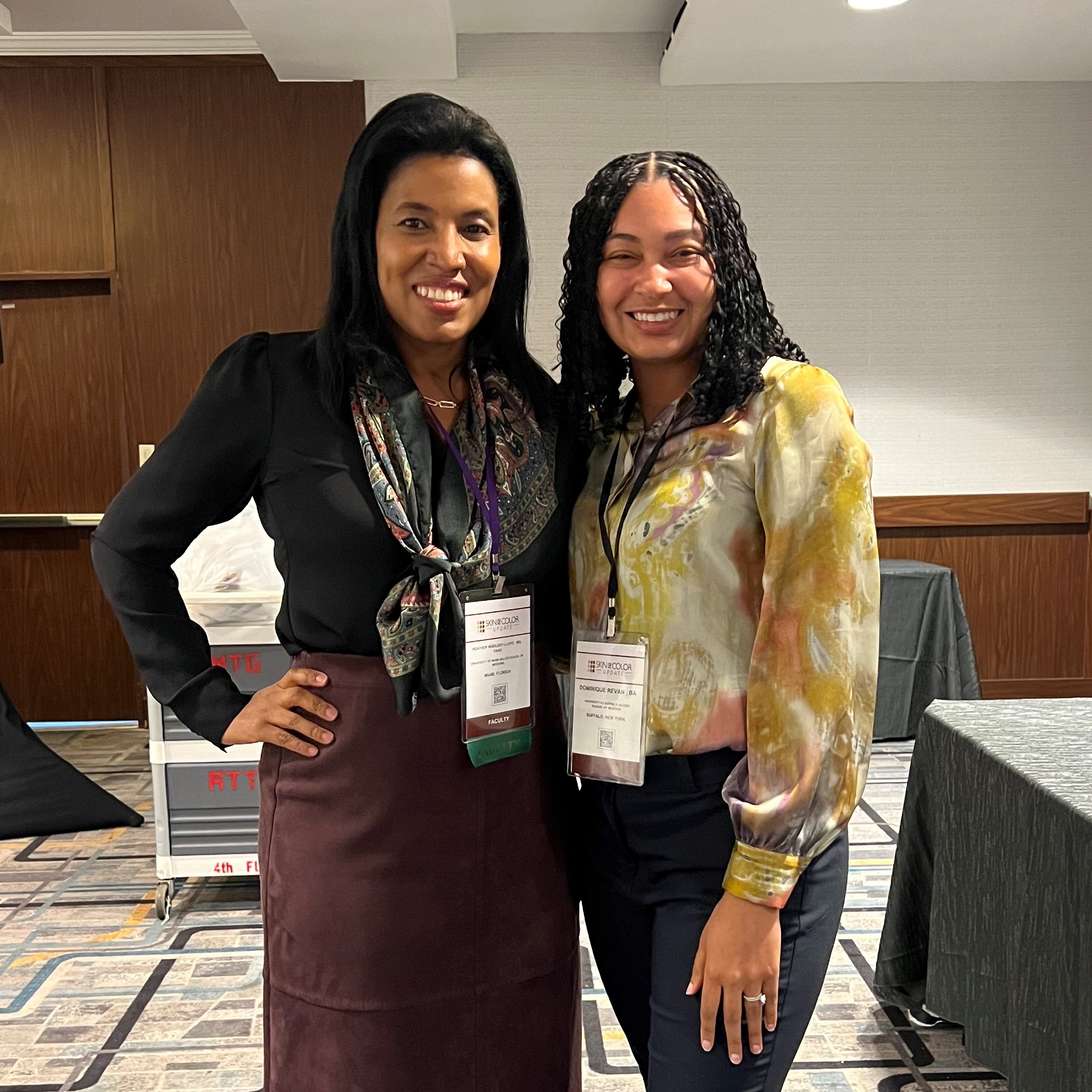
Mentee: Dominique Revan
Mentor: Dr. Woolery-Lloyd, MD
University of Miami Department of Dermatology
Through the SOCS Observership Grant, I had the privilege of spending a month in Miami under the mentorship of Dr. Woolery-Lloyd at the University of Miami (UM) Department of Dermatology. This experience was pivotal in shaping my dermatology journey. As the Director of the Skin of Color Division, Dr. Woolery-Lloyd's patient base is made up largely of women of color, and several patients expressed that my presence in dermatology is both needed and impactful—a sentiment that was incredibly encouraging.
During my rotation, I gained valuable insight into treating and preventing pigmentary disorders, which are a common concern for patients of color. Hyperpigmentation, stemming from sun damage, acne scarring, melasma, and more, was a prevalent issue I encountered. I also gained exposure to clinical research, which was very insightful. Dr. Woolery-Lloyd is particularly passionate about increasing participation of skin of color patients in clinical trials, as they have historically been underrepresented. We initiated several research projects together, including studies on the role of social media in diabetic skin care education and the effects of vitamin D supplementation in acne, hidradenitis suppurativa, and rosacea. These studies have been submitted for publication, with more in the pipeline.
Additionally, Dr. Woolery-Lloyd introduced me to many other experts at the UM Department of Dermatology. As I do not have a home dermatology program, this was my first experience working alongside dermatology residents and attending Grand Rounds. I had the opportunity to work at Jackson Memorial, a public hospital serving predominantly underserved populations. This was a profound learning experience, as many patients presented with advanced dermatologic disease and faced barriers to healthcare access. Nearly all the patients I saw were people of color, many of whom were immigrants from the Caribbean, Central America, and South America. I found myself speaking Spanish with patients 80% of the time, and it was deeply rewarding to use my language skills to serve and advocate for them. Witnessing firsthand how dermatologic care can significantly improve quality of life reinforced my passion for the field.
I also had the chance to write a case report on a patient with nail lichen planus, who had been misdiagnosed with nail psoriasis, leading to a poor prognosis. Unfortunately, such misdiagnoses are common for patients of color due to the lack of dermatologic education focused on diverse skin tones. This further fueled my commitment to addressing racial and ethnic disparities in dermatology, and serving this patient demographic solidified my vision for the future.
In conclusion, I am deeply grateful for the continued mentorship of Dr. Woolery-Lloyd. She has been an inspiration, demonstrating what I aspire to accomplish as a Black woman in dermatology. Her unwavering support has been instrumental in helping me accomplish research, gain clinical experience in skin of color, and build a professional network. I am thankful to SOCS for affording me this incredible opportunity.
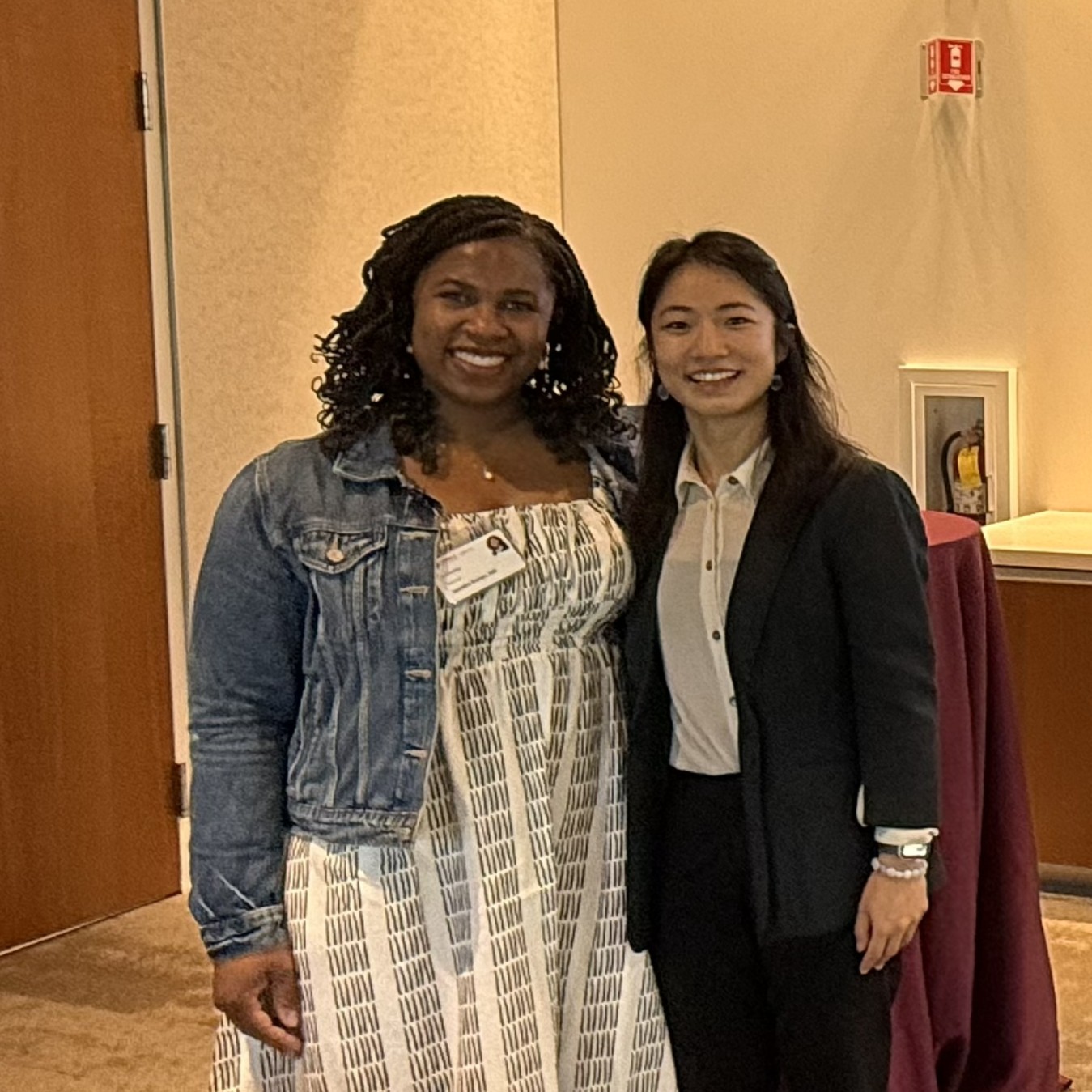
Mentee: Jordan Bui
Mentor: Leandra Barnes
Stanford University
I express my heartfelt appreciation to the Skin of Color Society for their support with an Observership Grant, and to Dr. Leandra Barnes at Stanford University for her unwavering mentorship. My time during this month was filled with many enriching experiences, academically and personally, and strengthened my commitment to advancing equitable and compassionate care in dermatology. I had the opportunity to attend the Skin of Color Program, an initiative spearheaded by Dr. Barnes, and the Hidradenitis Suppurativa (HS) Clinic. Through these experiences, I saw how Dr. Barnes provided each patient with individualized care to their needs, taking the time to understand the nuances of each patient’s presentation and the challenges they may have faced. With many HS patients having lived with painful symptoms for many years without a diagnosis, it was very impactful to see Dr. Barnes listen and validate their feelings, and reassure them that their diagnosis was not a cause of something they did. The relationship she created with patients with empathy and kindness is something I strive to emulate, taking her time with each patient. I also witnessed the importance of providing culturally sensitive care to patients, taking into account their customs and practices when creating a treatment plan. Dr. Barnes also had a wonderful procedure clinic where I got to learn about different surgical techniques she uses for deroofing procedures, especially in sensitive areas, and the extra consideration given to help patients feel more comfortable. Moreover, it was heartwarming to witness patients’ confidence increase after seeing their treatments work at follow-up visits of post-op visits for acne keloidalis nuchae or HS deroofing.
During my Observership, I also had the opportunity to work in other clinics such as Dermato-Oncology and High-Risk Skin Cancer. I learned how adverse cutaneous reactions from cancer therapies and different neoplasms may appear differently in patients with skin of color, and how to recognize the subtle nuances that can aid diagnosis. Each of the specialty clinics had a unique patient population, and I am grateful to have had the privilege to learn from these visits. In my final week of the Observership, Dr. Barnes coached me on how to give a Grand Rounds Presentation and create an engaging presentation. The compliments I received afterwards speak to the fantastic mentorship I had from Dr. Barnes. Lastly, Dr. Barnes and I designed a qualitative interview project for adolescent patients with HS to learn more about their lived experience and any barriers they may have faced in access to care. In having a better understanding of the challenges patients may face, we can better tailor our care and advocate for improved resources for our patients.
Overall, my observership was an incredible and inspiring experience to learn about the clinical, research, and collaborative aspects of dermatology. My time here has reinvigorated my passion for dermatology and research and the great potential for an academic career to advance the field. The warm and supportive environment at Stanford was apparent from the first day, and I am grateful to the entire department for taking the time to teach me throughout my observership. The mentorship I received has been invaluable, and I look forward to passing this forward in my future career and in the Skin of Color Society, championing the values of diversity, equity, and inclusion in dermatology.